Game Dev Story
by Jace
Prepare for a tale tinged with sadness, about lost games, wasted years, and the rebirth of an entire gaming genre. We begin back in the days when game code dripped from teenage boys’ bedrooms. When maverick designers like Matthew Smith shone like beacons of hope to all aspiring school boys with a grasp of Sinclair basic. This was the Wild West of gaming, a gold rush where original ideas were valuable currency. The limited technical abilities and memory of the ZX Spectrum and Commodore 64 meant development times were fast, and a competent programmer could churn out five to ten games a year, earning a fortune in the process. The vibrant UK games magazine industry provided the perfect launch pad for hundreds of tiny software houses, if you couldn’t get anyone to sign up your game, then just duplicate it yourself and put out a mail order advert. Until the recent rush for digital distribution, I never thought we’d see the like of these days again.
The remarkable thing about the whole concept of writing games and releasing them yourself, was that it spawned its own genre. The ‘Software Company’ management game. These are games where you manage the development of new games, and release them into the market, usually controlling distribution and advertising. A simulation of actually running a successful games company. There were only ever a handful of these games released, the first I played was in 1984, Millionaire by Incentive.
Millionaire was a highly rated game, scoring 80% in Crash magazine. Progress is marked each month by your current residence, as your company grows you move to bigger and more lavish houses which are depicted in typical 8-bit style. Unfortunately the game is flawed, with a tipping point a few years in. The whole game turns against you, as it becomes impossible to manufacture enough cassettes without resorting to the help of ‘Dodgy Dave’ to satisfy demand and, in doing so, you leave yourself liable to huge penalties, and tumble back through the housing types till you end up back in your hovel.
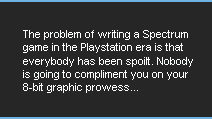 The real breakthrough for this fledgling genre came from the often forgotten king of strategy games, Kevin Toms. While many remember 1982’s Football Manager as his genre gift to the world, his subsequent games contained a magic he was never truly recognized for. It’s not the graphics or presentation, but the ideas and incredible mathematical balance he managed to orchestrate so perfectly. There’s no better example than with his long forgotten 1985 title, Software Star.
The real breakthrough for this fledgling genre came from the often forgotten king of strategy games, Kevin Toms. While many remember 1982’s Football Manager as his genre gift to the world, his subsequent games contained a magic he was never truly recognized for. It’s not the graphics or presentation, but the ideas and incredible mathematical balance he managed to orchestrate so perfectly. There’s no better example than with his long forgotten 1985 title, Software Star.
Claiming a prize of just 64% in Crash Magazine, who also accused the title of having no graphics at all, Kevin’s second game saw you trying to get your games to number one in the chart for a long enough period to claim the title of Software Star. View me how you will, I make no apology, but this tiny 48k slice of magic has probably eaten up over 200 hours of my life since its release. Over the past twenty five years I’ve taken time to try and dissect the ingredients which make it so appealing, and there are several important factors.
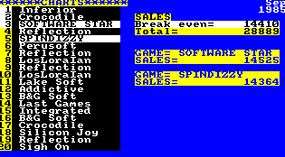 One is the very reason it was derided at release, simplicity. A quick monthly cycle, a few presses on the keyboard and the next month begins. The ability to release more than one game at a time is very important, and so is being free to name each game individually. The random nature of monthly game development and the fluctuating size of the market depending on the month of the year makes choosing your release month vitally important too. Most important though is the pay off, the full screen chart where you see your games slowly rise to the top.
One is the very reason it was derided at release, simplicity. A quick monthly cycle, a few presses on the keyboard and the next month begins. The ability to release more than one game at a time is very important, and so is being free to name each game individually. The random nature of monthly game development and the fluctuating size of the market depending on the month of the year makes choosing your release month vitally important too. Most important though is the pay off, the full screen chart where you see your games slowly rise to the top.
Like any game you’ve played so much though, there are flaws in Software Star too. Meet the challenge of becoming Software Star for ten months, and the target just doubles, the game doesn’t change – it’s so well balanced it doesn’t really need to – but the desire for something else to happen spoils the achievement. As a side note, Kevin’s next and last non-football game was the equally well balanced President; I can only imagine how disappointed he was when it earned just 29% in Crash magazine. Software Star may not have been a huge commercial success, but the genre did stumble on for a few more years, seeing the disappointing ‘Just Imagine’ by Pirate released in 1986 (59%) and ‘Software House’ by Cult released in 1988. Both suffered from being poorly constructed, making it easy to cheat your way through them.
Now, at the beginning of this ramble, I did say this was a story of lost games. Perhaps the reason why Millionaire and Software Star were so appealing to me was because in 1985, at fifteen years old, my dream was to be a games designer. With a basic knowledge of, well, basic, and a patchy ability to manipulate machine code subroutines, I began to write games. Stuck typing away in my bedroom for the full six week school summer holiday, the fruit of my labour was ‘Computer Manager’ (think I still have the tape somewhere). This game was similar in style to Software Star, but had you building computers and consoles rather than software. I anxiously sent it off to my hero Kevin Toms and waited to see if he’d release it under his Addictive label. The rejection letter was kind, but not actually from Kevin, which disappointed me greatly at the time. Undeterred I began work on my next game.
Whizkid (sadly lost) was a blatant take on Software Star, complete with animated games chart, but featuring two player turn-based play. Finally you could challenge a friend, and take your rival games companies head to head. This one was rejected by Bug Byte and, influenced by my teenage angst, I didn’t even send a copy to Kevin. My third game was much more proficient than either Computer Manager or Whizkid. Splash Du Cash (not lost) featured exploding menus and natty presentation. Unfortunately, this management strategy game centered on schoolboy piracy, with you duplicating and selling copied games to friends. This one was, unsurprisingly, rejected by CCS and Argus Press. My 8-bit coding days came to an end, but the dream of creating a truly brilliant ‘Software Company’ management game remained.
Roll on to 1996 and the second year of Retrogames. I was buzzing with ideas and inspiration. I was trying to source products to sell within the Retrogames fanzine, we’d released audio cassettes of Commodore 64 soundtracks, I’d started work on a VHS Video of classic games in action, but I still had the unscratchable itch of game development in the back of my mind. A grand announcement followed in the next issue: we were going to release a brand new Spectrum game. Work on my magnum opus began.
The problem of writing a Spectrum game in the Playstation era is that everybody has been spoilt. Nobody is going to compliment you on your 8-bit graphic prowess, or amazing sound effects when they can play Wipeout. The biggest problem, it turned out, was too many ideas for the limitations of the format. Even 128k wasn’t enough for the behemoth my game had become. I kept people updated in the magazine, but by 1998, I’d given up chopping things out of it, and the game and data became dormant once more. However, the itch continued. Retrogames came about because of my love of the history of gaming, but to some extent it is a torture running a company dealing with the history of gaming, when it’s a history you so wished you’d been part of, triumphing the work of so many great programmers when your small contribution lays languishing unpublished in a box somewhere. The itch got itchier.
Roll on another eight years to 2006, and after dabbling in programming applications on the PC I found the confidence to begin work on my game again. I have no idea how ‘real’ coders work, but I seemed to write my game in fits and starts. A solid month of daily work, then a lapse of three months while my batteries recharged. The problem with stopping and starting writing a computer program is that you forget where you were and what variables do what; it takes at least a couple of weeks to just get back into the swing of things and remember what you were doing. In any case, I was in no rush; this was a genre which has lain dead for nearly twenty five years, it would be ready when it was ready, and whenever it was released, I knew it would be a landmark achievement for Retrogames to release its own game. I knew it would appeal to fans of classic gaming, but the most important thing for me was that I’d enjoy playing it how I enjoyed playing those old games it’s based on. That was all until…
Game Dev Story by Kairosoft. It is a game sourced from Japan and released for the Iphone, seemingly un-influenced by any of our Western ‘Software House’ Management games, yet strikingly similar in style and form. Despite wishing for new members to this genre for over twenty years (Segagaga doesn’t count, it’s a mini-game collection), I’d never heard of the original 1996 PC version of Game Dev Story, as it was only released in Japan and never localized into English. There’s a PC sequel too, which is also heading to Iphone in the coming year. Its discovery was both a moment of intense excitement, and also disappointment.
The game concentrates on development, with you choosing and managing staff as a way of making better games. The pay off is watching your games develop, with each of their four facets improving through the development stage with a random element. New consoles are launched in this imitation of gaming history, and if you are successful training your staff you can create a hardware engineer and develop your own console.
Like every other game mentioned in this article, Game Dev Story has its faults. Due to the length of time that game development takes, it is virtually impossible to release more than one game at a time. It would be nice to hold back releases, or at least release a barrage of poorer quality titles in the Winter season to take advantage of the increased market. When you finally get to release your own console, it’s impossible to promote it effectively, and sales just tail off when you reach a predetermined market share. It’s also possible to sell considerably more copies of a game for your console than there are consoles sold, something I think they’ve tried to get out of with one of the game reviewers saying ‘I like it so much I bought three copies’. However, Game Dev Story is certainly a big step forward from Software Star. You can still name all your games, it recognizes sequels, is sprinkled with comedy, and is just as insanely addictive as the rest of these games. Finally the genre is reborn, but what of my game, the game which was supposed to be the catalyst to jump-start this long forgotten game type.
Well, ‘Retro Battle‘ (URLs registered some years ago) is a more thorough realization of gaming history. Starting in 1977 you buy one of three vintage companies, Grandstand in the UK, Magnavox in the USA or Popy in Japan. You then proceed, on a turn-based basis, to hire staff and develop consoles and games. All players start with a simple Pong style TV game as their first machine, but can develop a new machine to replace it from the very start. The reason for choosing those three companies is because they turned out not to be big players in the history of videogames. That leaves the game free to venture forward using real companies and events, allowing the player to literally play through the history of videogaming, and hopefully learn something along the way.
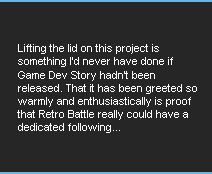 Unlike the other games in the genre, ‘Retro Battle’ is very data heavy. Building a console or computer allows you to choose the CPU, memory, sound and graphics chips, and as technology progresses, these options change throughout the game. Game development is data heavy too, with different genres more popular at different periods, like fighting games in the late 1980s for example, and facets like packaging more important in the 16-bit era than later. It’s possible to release up to ten different games at the same time, and these can be in a variety of formats, including your own. If you want to release games on the NES, you’ll be paying licensing fees to Nintendo, so if your games are huge sellers, you’ll help them grow too.
Unlike the other games in the genre, ‘Retro Battle’ is very data heavy. Building a console or computer allows you to choose the CPU, memory, sound and graphics chips, and as technology progresses, these options change throughout the game. Game development is data heavy too, with different genres more popular at different periods, like fighting games in the late 1980s for example, and facets like packaging more important in the 16-bit era than later. It’s possible to release up to ten different games at the same time, and these can be in a variety of formats, including your own. If you want to release games on the NES, you’ll be paying licensing fees to Nintendo, so if your games are huge sellers, you’ll help them grow too.
Then there are the all important charts: a top five for consoles, a top twenty for games, with each entry starting at the bottom and slowly pushing upwards. It’s the pay off that worked so well in Software Star, and one of the most important parts of my game, even more so, because Retro Battle allows two player turn-based play. Even if you manage to survive to 2010 and finish the game, you’ll still want to play it again and again if you’ve got someone to challenge you. And yes, I realize in this world of MMORPG real time worlds, two player turned-based text strategy games sound a bit naff, but hey. My dream was to create a game which followed real events; the Spectrum comes out in April 1982, the Electron in November 1983, but what happens around these predetermined events is influenced by how successful you are in the game.
Perhaps Commodore gets squeezed by player two’s format and the Spectrum lives on, re-invented for the 32-bit era; perhaps the Sega Saturn decimates the Playstation and Sony pull out of gaming. Why not abandon console development, and just put out quality games on your rival’s console, helping to narrow the markets of all the other manufacturers? All eventualities to be calculated, making each game just as exciting as the last. A data heavy software behemoth (again), which, while currently in a running state, still needs a lot of development to get it to perfection.
So, what will happen to Retro Battle Now? Good question, though I ask it myself. Lifting the lid on this project is something I’d never have done if Game Dev Story hadn’t been released. That it has been greeted so warmly and enthusiastically is proof that Retro Battle really could have a dedicated following. I have such an intense vision for how this game should be and getting it perfect is not going to be easy, particularly for me. The graphics are cobbled together, the program is crude and, I think, over complicated. At the beginning of last year I naively wrote to Microsoft hoping to be able to present it to them. I toyed with contacting Peter Molyneux who I met back in 1995, and whose passion for innovation I admire so much. I never did. And even by 2006 gaming had moved on – PC isn’t the right format anymore – to be successful this would need to be an IOS game, or a Facebook game. The cards are stacked against the game ever seeing the light of day, unless of course, an inspired developer happens to be reading this… you know where to find me.
Last five articles by Jace
















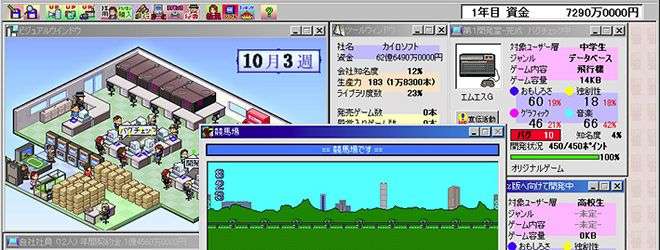
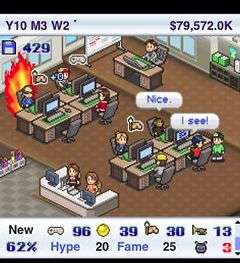





Sounds like my kinda game, I would love to see a game like this and have gameplay similar to The movies. In fact I would love to see Lion head studio to develop a game developer business sim game in the style of the movies. I love these kind of games where you build a business or city and watch it grow from a small business or town to a thriving business or city. Unfortunately I haven’t found any decent games like this. Nice article
Very interesting and close to my heart. I dabbled with making games on the Speccy also. My last effort was half-written for the Speccy Crap Games Compo. It was called Grand Text Auto and was basically Dope Wars for the Speccy. It half worked as well.
Great stuff, Jace.
Thanks for the comments guys. Lorna!! You didn’t put the screen shots of my game I sent over for this
Interesting article Jace, I love Game Dev Story its a great game. Also I for one would like to play your game if you ever got around to finishing it. I agree though that maybe the PC is the wrong format for it. I could see it doing really well on facebook but then you’d have to get into the whole micro transaction thing if you were to make any money from it. Perhaps iOS would be the better option in the long run? That’s assuming you are in this for the money!
Anyway, please keep us informed of your progress on the forums, and Lorna, I want to see screenshots!
Cheers Ste,
I’m not in it for the money, i’m passionate for the game, and would love people to play it. And yes, I agree facebook would fit perfectly, but I would have no idea how to start writing a facebook game. That’s the problem with programming languages, they take so long to learn that making a change is so painful. Like switching from myspace to facebook times ten. The dream now is for some small IOS or Android developer to say, you design it, we’ll build it.
The good point about Lorna not adding the screenshots (yet hopefully), is that you haven’t seen how bad my graphics are, lol.
Ah… I have to put my hands up and say that it’s my fault there are no screenies! I neglected to tell Lorna that the article had any, so she worked with what was sitting in Drafts… and of course WordPress has made the article uneditable now but leave it with me and there’ll be a v2.0 shortly!
Now, to the article… I heard so many good things about Game Dev Story but never got around to charging my iPod Touch to play it. It has basically become a shiny ornament on the shelf of my office since I got my HTC Touch Pro 2, but the game DID intrigue me, especially when everyone kept talking about how addictive it was.
The closest I ever came to it, I suppose, were the countless times I played through “A Rockstar Ate My Hamster” where you had to select your talent from a pool of renamed celebs like Stiff Pilchard, Midge Sewer and Izzy Asbeen before deciding on songs to make up their albums, picking producers, selecting video locations as well as a director, and then marketing them to get the all important platinum discs. Along the way you had to decide on sponsorship tie-ins like Soma Electronics (presumably Sony) and, invariably, something would end up going wrong with the sponsors like their TVs would fry brains or something and you’d have to deal with the consequences. Throw in the paparazzi and tabloid journos and you have a perfect representation of the celeb hype that we have today. It was fantastic. Utterly fantastic.
I had no idea that there were any for video game development though, and it sucks that you were beaten to the finish line by others as I think it could have been another cult hit if you’d followed it through. It’s one of those things though, and if I was able to follow through on all the ideas I had before anyone else had done them, I’d be typing this from a capsule orbiting Mars.
To be perfectly honest though, I don’t think you should give up on it. It would be far easier to complete it and then pass the finished article over to an experienced iOS programmer to turn it in to a modern format than to have someone build it from scratch using only a brief and some conceptual art. I’d finish it. Absolutely!!
Really enjoyed this, as it was a bit of a gaming history lesson for me and because I learned more about your passion for gaming and how deeply it’s rooted. I had no idea!
Hi Markuz, loved your comment, thanks,
If you loved Rockstar ate my Hamster, you need to play ‘The Biz’ by Chris Sievey (lead singer of ‘real’ punk band, The Freshies).
It’s the game ‘Hamster’ immitated, but didn’t come close to matching. You started as a humble roadie, formed a band, worked local gigs, tried to score a record contract, finally working your way up to playing Wembley stadium, and sitting at the top of the charts. The bit I most remember is when you chose to dabble with drugs to aid your songwriting, only for the screen to start pulsing with purple squares making the text very hard to read until the effects worked off. ‘The Biz’ remains in my top five all time speccy games.
If anyone else is into these kinds of games, search out ‘Hype!’, it’s the same kind of music career game, but in board game form, released by Virgin in the mid-80s, and is great fun to play with friends.
Chris Sievey was also Frank Sidebottom fact fans.
Jace totally knew that though.
Lol, yes Rich, Mr si-de-bot-em. Sadly missed.
I’ve read about developing for Facebook and I would have to say the easiest way is using .net, flash is pretty easy apparently but its not really cross platform. I would say android or Facebook as with android you can do it for free and get revenue from ads in the game or charge to download. I would love to see your game when its finished
if it was on an iSomething i’d buy it
I hate having a good idea and not following it through so I always take them as far as I can before everybody around me gets annoyed. Stick with it – what’s the worse that could happen?
Very interesting read, man. And I’ll add to the others; if this got built, it would get bought.
My cousin dabbles in programming, and from what I’ve seen of it, it looks impossible. I’m so jealous that people have a knack for coding and getting their heads round things like this. For me, if it isn’t words, I can’t use them very well.
I don’t know how simple it’d be to port it to something like XNA and create + upload it on Xbox Indie, but that might be worth a shot? I know a lot of mobile games have grown from that area, so… yeah.
Anyway, mate; great article and best of luck with completing it.
Huge thanks guys for all your support, I guess it’s time to dust off the PC and get back on with it xxx
Great article, and if you released it I’d try and find a way to play it, seeing as I haven’t taken a foray into that genre yet and you’ve made it sound like something I’d really enjoy.
If you continue work on it then good luck!
I used to try and dabble with some of the adventure game creators, hoping to make the next great text adventure but was too young to really get to grips with them, so all my glorious notes went unused. The days of the Speccy and co. were great for developing… all those bedroom coders and the start of many promising careers. I think that with XMA and iPhone, etc. we are seeing a renaissance of that pretty explosive creative period, where you don’t have to be a big company to get your vision out there and it is great. Wish you all the best. Maybe one day you’ll play my text adventure and I’ll play your iPhone game
I’d really enjoy playing this, if you ever finish it. I find the whole thing fascinating. And I still play PC games generally, but management ones specifically.
Hate football, but I play Football Manager. That’s how much I crave after text-based management strategy titles. Seriously, if you ever finish, let me know.
Me too Samuel, text based management games don’t appeal to many, but those who love them would play them over anything else. It’s just sad that you have to go 8-bit to play the best ones ;o)
If anyone happens to stumble across this article in the future, i’ve added the screenshots of the game to our facebook page,
http://www.facebook.com/media/set/?set=a.145737675495515.32278.145698245499458